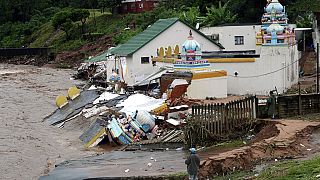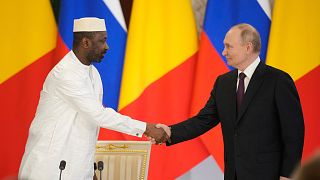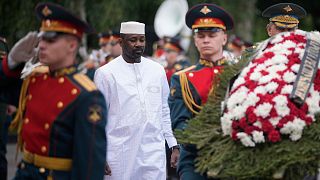Mali
Fake news is flooding Africa's conflict-ridden Sahel, according to experts, sowing discord and confusion in the increasingly volatile region.
Doctored news bulletins and altered photos often spread like wildfire on social networks in the region, where access to traditional media is patchy.
Militants are waging a brutal insurgency across much of the vast region, having first emerged in Mali in 2012 before spreading to Burkina Faso and Niger.
Thousands of people have died and around two million have been displaced by the conflict despite the presence of thousands of French troops.
Fake news has thrived on the turmoil, notably videos and photos that are altered with the aim of casting France or regional West African alliances in a poor light.
Experts say the phenomenon is becoming even more frequent.
"There was a lull in the production and circulation of fake news for a while, but it has picked up again," said Abdoulaye Guindo, coordinator of the Malian news website Benbere.
One recent fake video appeared to show rioters sacking Burkina Faso's embassy in Mali, which was portrayed as a reaction to Burkina Faso's support for sanctions on Mali from the West Africa bloc ECOWAS.
In reality, the footage showed a protest in Angola.
Caroline Taix, the head of AFP's fact-checking service for Africa, said there has been a "sharp increase" in fake news in Mali since October. A similar jump has occurred in other Sahel countries beginning this year, she added.
While it is unclear what is driving the surge, it comes at a time of heightened political tensions across the Sahel.
Mali's relations with its international partners -- particularly France -- began to deteriorate after the military seized power in 2020.
Then the Economic Community of West African States (ECOWAS) imposed a trade embargo and closed borders with Mali in January over delayed elections.
Neighbouring Burkina Faso's military also seized power in a putsch last month, raising fears of Sahel-wide instability.
'At odds with reality'
It is almost impossible to quantify the reach of fake news in the Sahel, with much of the content forwarded on WhatsApp. Nor is it easy to identify its origins.
Many of the videos circulating mimic news broadcasts, and they often feature a robotic voice criticising French troops or supporting the intervention of Russian soldiers.
In one recent example, a fake news broadcast claimed that France was bribing political parties to oppose Mali's military junta.
Malian researcher Baba Dakono told AFP that the phenomenon allows opinions to be formed "on the basis of information that is at odds with reality".
Such false information "could lead to regrettable situations where people are taken to task, lynched," he added.
An official at Niger's presidency, who requested anonymity, said that recent months had also seen a rise in more slickly edited fake news packages, as opposed to more obviously doctored or falsely labelled versions of existing footage.
'Information war'
One African diplomat stationed in Bamako, who also requested anonymity, told AFP the recent flood of fake news was part of an "information war".
Mali has come under harsh criticism, notably from France, for its alleged use of Russia's Wagner private security firm, which the US and others say has deployed to the country.
The junta has denied contracting the Wagner group.
Kall Moutari, a Nigerien MP and former defence minister, agreed that an information war was under way.
"It's a cold war between powers, between European democracies and some of their adversaries, led by the Russians," he said.
Twitter accounts backing France's presence in the Sahel have also proliferated in recent months.
In December 2020, Facebook shut down three online influence networks on its platform -- one originating in France and two in Russia.
"Although the people behind it attempted to conceal their identities and coordination, our investigation found links to individuals associated with French military," the US firm stated.
The French government responded at the time that it was "not in a position to attribute responsibility" for the online campaign.
Russia has repeatedly denied carrying out disinformation campaigns on social media. The Kremlin also denies maintaining links with the Wagner group.











01:09
Guinea presents draft for new constitution, referendum set for September
01:00
Detained Chadian opposition leader Succes Masra ends hunger strike
01:31
Sahel region hardest-hit by terrorism worldwide, says Global Terrorism Index 2025
01:14
Mali: Assimi Goita could soon be president until 2030 - without an election
01:49
Russia says it plans to boost economic and military cooperation with Africa
Go to video
Wagner group announces withdrawal from Mali after “mission accomplished”